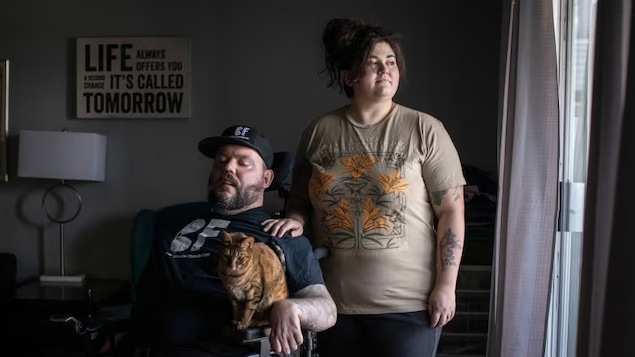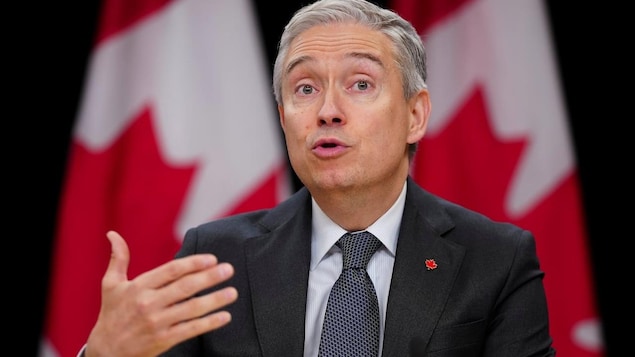- Home
- Politics
Federal ministers hold national summit on mistreatment of airline passengers with disabilities

Ryan Lachance, who lives with quad-spastic cerebral palsy, is pictured in his care aid Emma Proulx at his apartment in White Rock, B.C. in November. He says that in May 2023, he was dropped and injured while attempting to exit an Air Canada flight after the airline's crew failed to bring the equipment he needed.
Photo: (Ben Nelms/CBC)
'There could be penalties, it could be serious consequences,' says Transport Minister Pablo Rodriguez
Federal ministers are holding a National Air Accessibility Summit in Ottawa Thursday in response to high-profile cases of passengers living with disabilities being mistreated while flying with Canadian carriers.
Transport Minister Pablo Rodriguez and Diversity, Inclusion and Persons with Disabilities Minister Kamal Khera announced the summit in March and will host the Shaw Centre event.
The summit will hear from airline representatives and the disability community. A government release (new window) said the discussions will address the effectiveness of regulations meant to ensure accessibility.
This summit offers us a chance to listen and to learn from the lived experiences of passengers with disabilities so that collectively we can create concrete solutions,
Khera said Thursday in her opening remarks to the summit.
Airlines have taken heat in recent months over reports of passengers with disabilities being left to deplane without assistance, and of airlines misplacing vital equipment, such as wheelchairs.
On his way into Parliament Wednesday Rodriguez told CBC News airlines are coming to the summit in good faith to have those honest conversations.
He said he's looking for concrete solutions to a situation he called not acceptable.
Asked how he will ensure airlines fulfil their responsibilities, Rodriguez said Wednesday that there could be penalties, it could be serious consequences. All of that will be decided after this summit.
The CEOs of Canada's major airlines were called to appear before a parliamentary committee probing the state of accessible transportation.
The House of Commons transport committee held four meetings (new window) on the subject and will be delivering a draft report in the coming months.
Better data, regulations, enforcement needed, NDP says
NDP MP Taylor Bachrach, the party's transport critic, told CBC News Thursday morning that he is hoping to see a commitment from the minister that he will do what's required to ensure that Canada's air sector will be more accessible after the summit.
We've heard from leading disability advocates about the barriers they face. Now what's required is political will from the minister,
he said.
It was Bachrach's motion at the House of Commons Transport Committee that led to the study of accessibility. He says ensuring people living with disabilities can travel with dignity is a human rights issue.
We need better data, better regulations and proper enforcement,
he said.
After Rodriguez and Khera made their opening remarks, they hosted the first of two panel discussions. Participants in the first panel included representatives from the CNIB, the Autism Alliance of Canada, Procne Navigation, Spinal Cord Injury Canada, Wavefront Centre for Communication Accessibility and the Vancouver International Airport.
Advocates ask for consistency, shift in attitudes
Joanne Smith of Spinal Cord Injury Canada said it was important for her to be at the summit because she has seen a noticeable decline in accessibility service and safety when travelling with a mobility impairment.
It's undignifying, it's humiliating. We should be able to travel for work and pleasure and not have to have this kind of treatment,
she told CBC News.
Smith said she's been dropped by airline staff and has dealt with staff members who were improperly trained.
Baseline, we need enhanced education, training and communication,
she said. But underneath that, even more importantly, we need a shift in attitudes. There seems to be a fear or a lack of awareness of working with the disabled community.
Maayan Ziv is founder and CEO of AccessNow and a disability activist. She told CBC News the first session with advocates was useful.
It was really great to show both ministers show sincerity and acknowledge the very real barriers that Canadians with disabilities are experiencing. It wasn't sugarcoated,
she said.
The inconsistency in service for passengers with disabilities was a constant theme in the session, Ziv said.
Sometimes you might have a good flight, other times you're facing tremendous anxiety because your needs are overlooked,
she said.
WestJet chief executive officer Alexis von Hoensbroech apologized for the incidents in February, saying he hoped to improve travel accessibility.
To our guests who didn't have a good travel experience with us, we are sincerely sorry and we are committed [to] doing better,
von Hoensbroech said (new window) during an appearance before the transport committee.
Air Canada's CEO Michael Rousseau also faced tough questions at the committee over reports of passenger mistreatment during the past year.
We do make mistakes,
Rousseau told the committee. He pointed to an expedited accessibility scheme announced in November, along with new measures to improve the travel experience passengers living with a disability.
The parliamentary hearings followed several CBC News stories reporting incidents of mistreatment.
In one case, the federal government's chief accessibility officer, Stephanie Cadieux, flew from Toronto to Vancouver in October on an Air Canada flight only to discover that her wheelchair had been left behind.
Cadieux said that while her chair was safely returned to her by the airline the following morning, airlines that do not provide appropriate care and attention to essential equipment like wheelchairs leave travellers vulnerable.
I want everyone to understand that when a person's wheelchair is lost, so is their independence, safety, mobility and dignity,
she said.
Airlines have to take responsibility and they have to do better.
At the opening of the summit Thursday, Rodriguez said the Liberal government wants to make Canada a world leader in accessible air travel.
We can't treat a wheelchair like luggage, it simply isn't luggage,
Rodriguez added. That's why today we are here ensuring we build a better transportation system.
WATCH:Man forced to drag himself off Air Canada flight vows to keep fighting
Man forced to drag himself off Air Canada flight vows to keep fighting for people with disabilities
Air Canada has apologized to a B.C. man after staff told him he would need to get to the front of the plane without any assistance. The airline has also admitted it violated Canadian disability legislation. Rodney Hodgins hopes the situation will lead to systemic change.
Rodney and Deanna Hodgins flew from Vancouver to Las Vegas in late August to celebrate their first wedding anniversary. Rodney has spastic cerebral palsy and uses a motorized wheelchair.
They say he was forced to drag himself (new window) off an Air Canada flight in Las Vegas after the airline failed to provide the assistance he needed to safely exit the plane. Deanna called the experience dehumanizing.
You are watching this man grab the back of a chair and then struggle and fight while I'm on the ground, crawling on the ground moving his legs, and we're trying to get him to the front of the plane. I'm fighting his spasms trying to lift up his legs,
she said.
Ryan Lachance, a White Rock-based stand-up comedian who has quad spastic cerebral palsy and uses a motorized wheelchair, said that in May 2023, he was dropped and injured while attempting to exit an Air Canada flight after the airline's crew failed to bring the equipment he needed.
It was a massive struggle to get me out of the seat. I travel with a sling underneath me to make it easier for people to pick me up. They kept pulling that and it was hurting my body, bruising my back and my hip really bad,
he said.
Emma Proulx, Lachance's care assistant, was travelling with him at the time. She said it was painful to watch and it was painful for Ryan to experience.
The second panel features representatives from airlines and airports, including the National Airlines Council of Canada, the Canadian Airports Council, the Northern Air Transport Association, Air Canada, WestJet, the Canadian Union of Public Employees, the Canadian Labour Congress, UNIFOR and the Canadian Air Transport Security Authority.
Peter Zimonjic (new window) · CBC News




